Related Research Articles
The Syracuse Orange are the athletic teams that represent Syracuse University. The school is a member of NCAA Division I and the Atlantic Coast Conference. Until 2013, Syracuse was a member of the Big East Conference.

Harlan Orville "Pat" Page was an American football, basketball, and baseball player and coach. He was one of basketball's first star players in the early 1900s. The 5'9" Chicago native played guard at the University of Chicago (1906–1910) and was known as a defensive specialist. While leading Chicago to three national championships (1908–1910), the Helms Athletic Foundation retroactively named him an All-American each time and named National Player of the Year in 1910. Page also played football at Chicago. Walter Camp selected him as a second-team All-American at the end in 1908 and a third-team All-American at the same position in 1909.
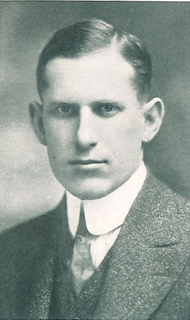
Howard Harding Jones was an American football player and coach who served as the head coach at Syracuse University (1908), Yale University, Ohio State University (1910), the University of Iowa (1916–1923), Duke University (1924) and the University of Southern California (1925–1940), compiling a career record of 194–64–21. His 1909 Yale team, 1921 Iowa team, and four of his USC teams won national championships. Jones coached USC in five Rose Bowls, winning all of them. Before coaching, Jones played football at Yale (1905–1907), where he played on three national title-winning teams. He was a member of the inaugural class of inductees into the College Football Hall of Fame as a coach in 1951; his younger brother Tad joined him as a member in 1958.

Clarence Lester "Biggie" Munn was an American football player, coach, and college athletics administrator. He was the head football coach at Albright College (1935–1936), Syracuse University (1946), and most notably Michigan State College (1947–1953), where his 1952 squad won a national championship. Munn retired from coaching in 1953 to assume duties as Michigan State's athletic director, a position he held until 1971. Each year, the Michigan State Spartans football team hands out the "Biggie Munn Award" to the team's most motivational player. MSU's Munn Ice Arena, built in 1974, is named in his honor. Munn was inducted into the College Football Hall of Fame as a coach in 1959, and, in 1961, he became Michigan State's first inductee into the Michigan Sports Hall of Fame. He authored the coaching textbook Michigan State Multiple Offense in 1953.
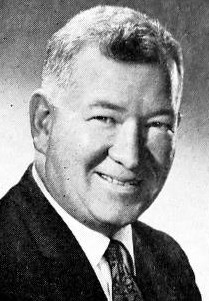
Hugh Duffy Daugherty was an American football player and coach. He served as the head coach at Michigan State University from 1954 to 1972, compiling a record of 109–69–5. His 1965 and 1966 teams won national championships. Daugherty's tenure of 19 seasons at the helm of the Michigan State Spartans football team is the longest of any head coach in the program's history. He was inducted into the College Football Hall of Fame as a coach in 1984.

Edwin Regur Sweetland was a coach, trainer, and athletic administrator at several American universities. During his coaching career he was head coach of many sports including basketball, track and field and crew, but the majority of for his coaching work was in football. Though mainly known for football, he left his mark on several college athletics departments and other sports. This includes being the first athletic trainer at Ohio State University, the first paid coach of the Kentucky Wildcats men's basketball team, and the first coach of Syracuse University rowing team.

Mark Beal Banks was an American football, basketball and baseball player, coach, and college athletics administrator. He served as the head football coach at Central University of Kentucky—now known as Centre College—in Danville, Kentucky (1909–1911), Ohio Wesleyan University (1912), Ohio University (1913–1917), Drake University (1918–1920), the University of Tennessee (1921–1925), and Hartwick College (1941–1948), compiling a career college football record of 100–73–10. Banks was also the head basketball and head baseball coach at Ohio Wesleyan, Ohio, Drake, and Tennessee. He played football, basketball, and baseball at Syracuse University.

William Marshall "Big Bill" Hollenback was an American football player and coach. He played football at the University of Pennsylvania, where he was selected as an All-American fullback three straight years, from 1906 to 1908. Hollenback served as the head football coach at Pennsylvania State University, the University of Missouri (1910), Pennsylvania Military College, now Widener University, and Syracuse University (1916), compiling a career college football record of 46–19–8. He was inducted into the College Football Hall of Fame as a player in 1951.

The Syracuse Orange football team represents Syracuse University in the sport of American football. The Orange compete in the Football Bowl Subdivision (FBS) of the National Collegiate Athletic Association (NCAA) and the Atlantic Division of the Atlantic Coast Conference (ACC).

William Jay Warner was an American football player and coach. Warner graduated from Cornell University in 1903 and was a member of the Sphinx Head Society. He was elected to the College Football Hall of Fame in 1971.
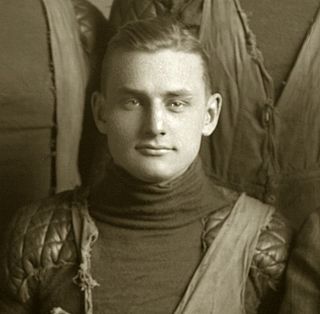
David Way Allerdice was an American football player and coach. He played football for the University of Michigan from 1907 to 1909 and coached football at Butler University (1910) and the University of Texas at Austin (1911–1915).
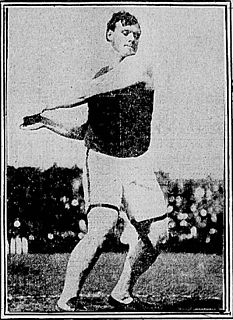
Marquis Franklin "Bill" Horr was an American football player, coach, and Olympic track and field athlete.
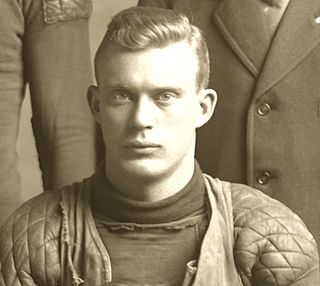
Prentiss Porter Douglass was an American football player and coach. He was a native of Martinsville, Illinois who graduated from the Culver Military Academy and the University of Michigan. He played football for Fielding H. Yost's 1907 and 1908 Michigan Wolverines football teams at the halfback position. After graduating from Michigan in 1909, he served as an assistant football coach at Michigan during the 1909 and 1910 football seasons. In 1911, he was the head football coach at the University of Kentucky. His 1911 Kentucky team finished the season with 7 wins and 3 losses. Kentucky was unscored upon in its first four games, surrendering six points to the University of Cincinnati in the fifth game. The season's highlights included the final two games, victories against Centre College and the University of Tennessee. After one year at Kentucky, Douglass returned to the University of Michigan where he served as an assistant football coach from 1912 to 1919. He retired from football after the 1919 season to go into business. Douglass died of a heart ailment in Lexington, Kentucky in 1949 at age 62.

The 1908 College Football All-America team is composed of college football players who were selected as All-Americans for the 1908 college football season. The only two individuals who have been recognized as "official" selectors by the National Collegiate Athletic Association (NCAA) for the 1908 season are Walter Camp and Caspar Whitney, who had originated the College Football All-America Team 14 years earlier in 1889. Camp's 1908 All-America Team was published in Collier's Weekly, and Whitney's selections were published in Outing magazine.

Lucius Horatio "Ray" Biglow III was an American football player and coach. He played right guard for Yale University from 1905 to 1907. He was selected as an All-American in both 1906 and 1907 and served as Yale Bulldogs football coach in 1908.

Bemus Pierce was an American football player and coach. He played as a guard in the 1890s and 1900s. Pierce played college football for the Carlisle Indian School teams from 1894 to 1898 and played professional football for the championship teams from the Homestead Library & Athletic Club of 1900 and 1901. He also played for the All-Syracuse team in 1902, the first indoor professional football team. Pierce served as the head football coach at the University of Buffalo in 1899, at the Carlisle Indian School in 1906, and at Kenyon College from 1908 to 1910.
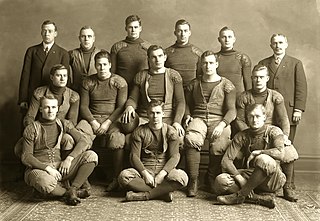
The 1908 Michigan Wolverines football team represented the University of Michigan in the 1908 college football season. The team's head coach was Fielding H. Yost in his eighth year at Michigan. The team compiled a 5–2–1 record, outscored opponents 128 to 81, and held five of seven opponents to six points or less. After opening the season with a 5–0–1 record, and allowing an average of four points per game, the Wolverines lost badly in back-to-back games against the 1908 national champion Penn Quakers (29–0) and Syracuse (28–4).
Elmer Thompson was an American football player. He played for Cornell University from 1905 to 1907 and was selected as a first-team All-American in both 1906 and 1907.
Robert W. Forbes (1886–1947) was an American football player and coach. He was a first-team All-American end for Yale University in 1906 and was the recipient of one of the most significant passes in the first season in which the forward pass was legalized. He later served as the head football coach at the United States Military Academy and the University of Oregon.